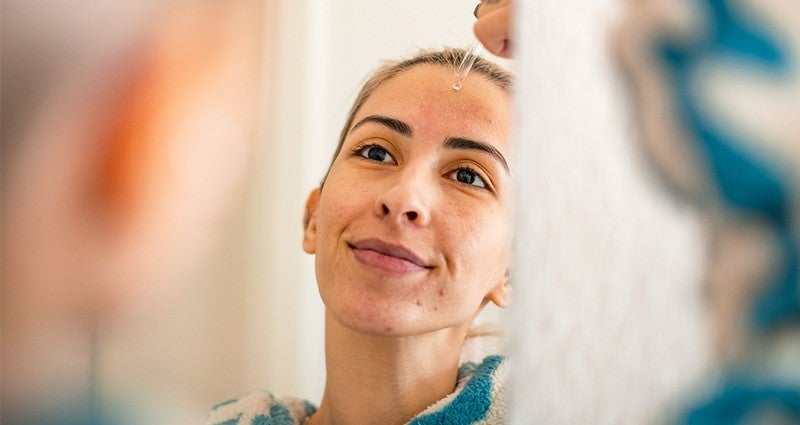Treating acne at any age, for any season

Acne is no joke, particularly as an adult. In fact, it's one of the most common skin conditions in the U.S.1
The American Academy of Dermatology defines "acne" as blackheads, whiteheads, pimples and cysts (deep, painful breakouts).2
There are many causes for adults to continue getting acne or to get it for the first time. They include fluctuating hormones, stress, hair and skin products, family history and some medical conditions. It could even be a side effect of certain medications.3
Acne facts
- Acne happens when pores get clogged with oil, skin cells and even bacteria.
- Acne can occur at any age.
- Newborns can develop acne in the weeks after birth. This type of (neonatal) acne usually clears on its own.
- Infantile acne can begin between 3 and 6 months of age. It is very rare and may cause cysts and scars.
- Many teens experience acne breakouts thanks to hormones during puberty. These cause oil glands to increase in size and produce more oil, which can clog pores.
- Adult acne is more common in women than men.
- Not enough sleep can make your acne worse.4
What to do
It’s important to remember, says Dr. Jeffrey Zwerner, Senior Medical Director for Dermatology at Teladoc Health, acne is not the product of a dirty face.
“Over-washing is not going to help treat or prevent acne. In fact, if you over-wash your face, it will become excessively dry, causing your body to produce more oil,” he says. One or two daily washes is best.
The American Academy of Dermatology recommends gently lathering with a mild, non-comedogenic face wash and rinsing with warm water. Avoid the tendency to use abrasive products or scrubs, which further irritate your skin.4
Here are some other things you can do to help reduce outbreaks:
- Put stress in check. Studies have shown a relationship between stress and acne flare-ups. Our bodies react to stress by producing hormones that can stimulate oil glands and hair follicles and lead to acne.3
- Resist the urge to pick, pop or squeeze. This can make it take longer for your acne to clear and increases your risk for scarring.5
- Talk to a dermatologist. They can work with you to determine which products, treatments or medications are best suited to your condition.
What not to do
- Frequently change products. It may take some time before you notice improvement. Completely clearing up your skin can take a few months. Be patient and give treatments time to work.6
- Spot application. Instead, apply a thin layer of product over all acne-prone skin to treat what you see and prevent new breakouts.4
No matter what the cause, with the right steps acne is a treatable condition.
Eating a healthy and balanced diet benefits your whole body. Learn which fats are good for you and which are not.
1https://www.ncbi.nlm.nih.gov/pmc/articles/PMC9122273/
2https://www.aad.org/public/diseases/acne/really-acne/overview
3https://www.aad.org/public/diseases/acne/really-acne/adult-acne
4https://www.aad.org/public/diseases/acne/causes/acne-causes
5https://www.aad.org/public/diseases/acne/skin-care/tips
6https://www.aad.org/public/diseases/acne/skin-care/habits-stop
Was this article helpful?
Don't wait! Unlock a healthy, happy new year, at no cost to you.
This content is not intended to be a substitute for professional medical advice, diagnosis or treatment. Always seek the advice of your physician or other qualified health provider with any questions you may have regarding a medical condition.
